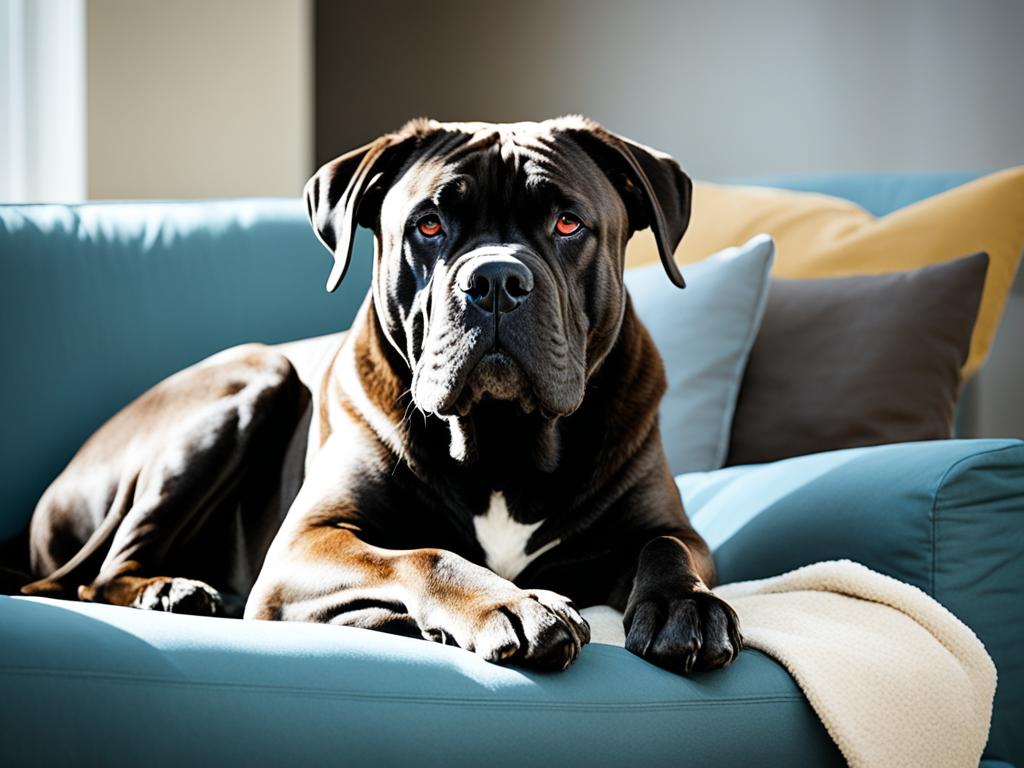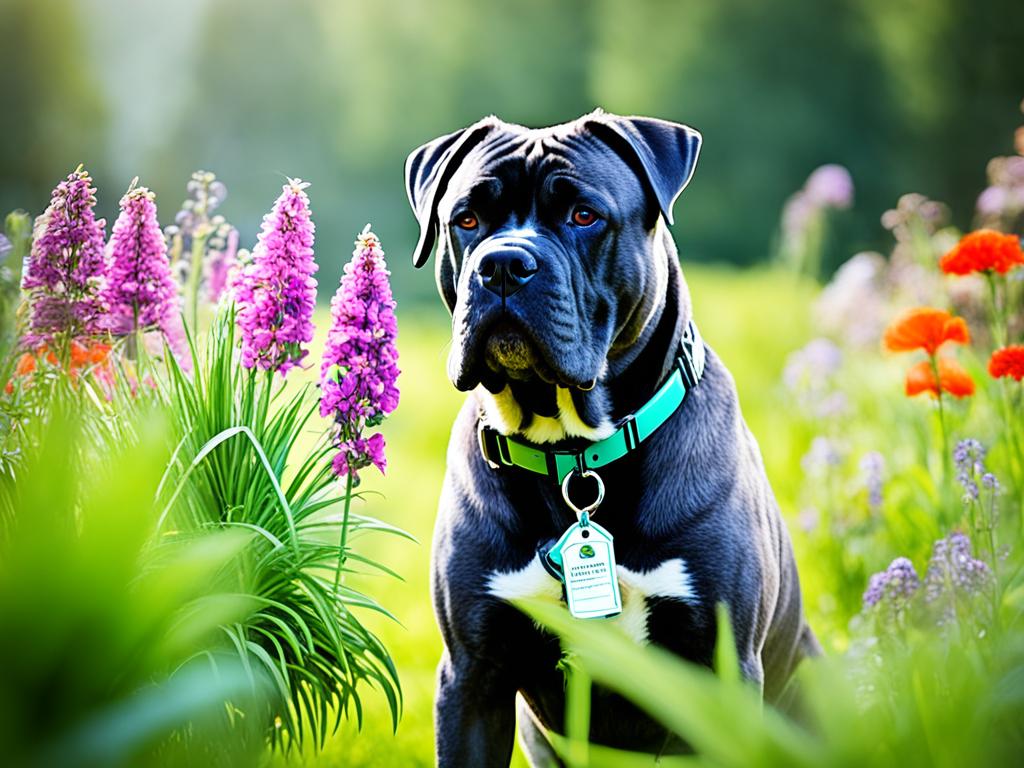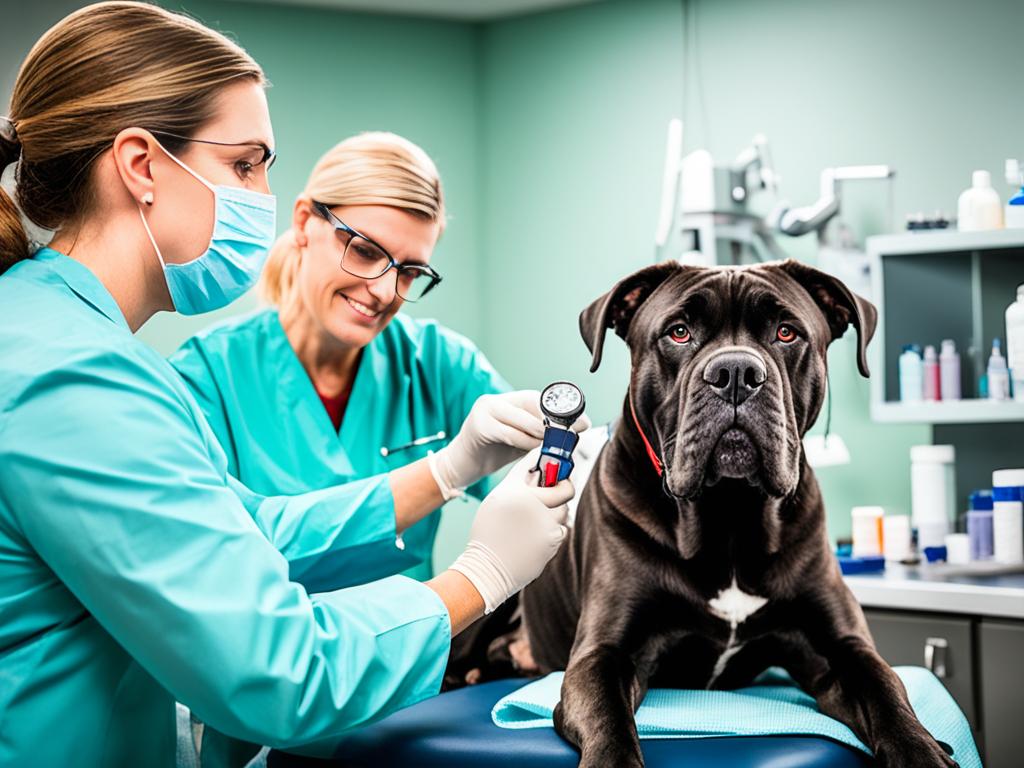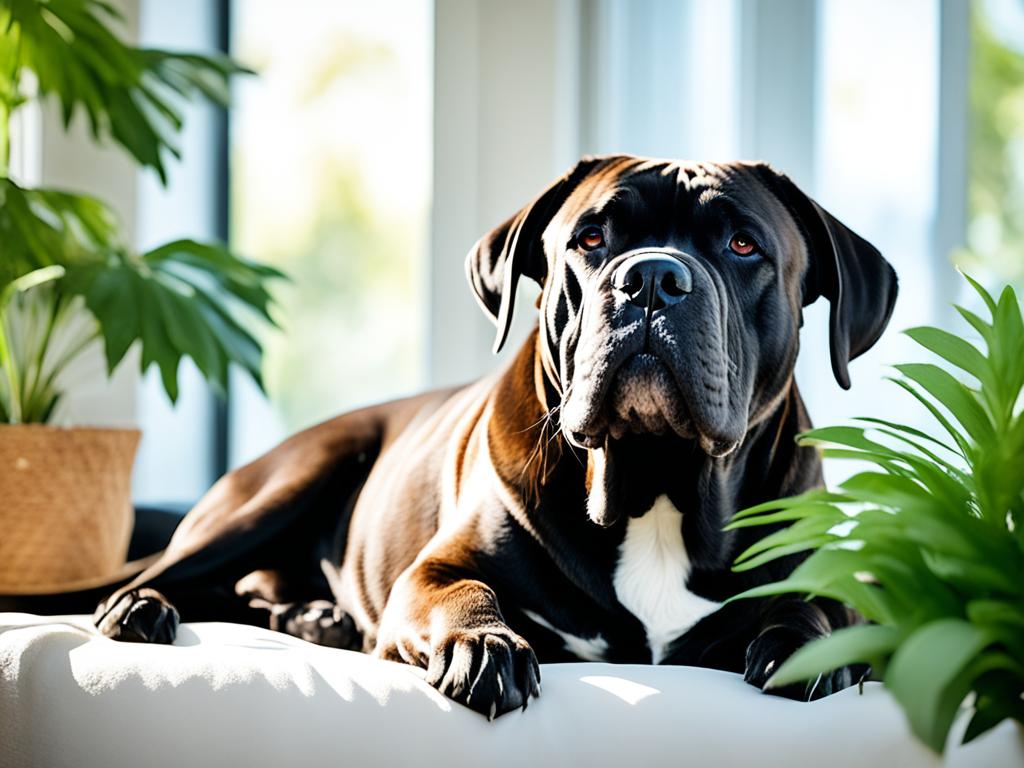Did you know that food allergies affect about 10% of all dogs? Amongst large breeds like the Cane Corso, owners often face the challenge of managing complex allergies that can greatly impact their pet’s quality of life. A robust regimen of Cane Corso allergy care is vital, as symptoms can escalate beyond mere discomfort to more severe health concerns. Alongside veterinary guidance, prevention strategies, pinpointing symptoms, and investing in treatment are cornerstone practices for maintaining the well-being of these majestic canines. Furthermore, hypoallergenic options are gaining traction as a proactive approach to alleviate and prevent allergic reactions in these sensitive giants.
Key Takeaways
- Understanding the prevalence of food allergies in dogs is crucial for early detection and management.
- Identifying symptoms promptly can lead to more effective Cane Corso allergy care and less suffering.
- Prevention, including hypoallergenic dietary choices, is key to minimizing the risk of allergic reactions.
- Treatment options vary and should be customized for each Cane Corso’s specific needs.
- Owners should consult with veterinarians to devise a personalized plan that encompasses allergy prevention, identification, and management.
Understanding Cane Corso Allergies
When dealing with Cane Corso allergy care, pet owners swiftly realize that an understanding of symptoms and treatments is vital for maintaining their beloved companion’s health and happiness. With the myriad of allergens present in everyday life, identifying the root of a pet’s allergy discomfort can present an ongoing challenge.
Identifying Common Allergy Symptoms in Canines
Dogs, much like their human counterparts, can exhibit a range of allergic symptoms. These symptoms often mirror those experienced by people and can escalate without proper intervention. Among the symptoms to look for are:
- Itchy skin
- Hives
- Gastrointestinal upset, such as vomiting or diarrhea
- Respiratory issues, including coughing and wheezing
Knowledge of these common signs is instrumental in the early detection and effective management of allergies.
Distinctive Signs of Allergies in Cane Corsos
Specific breeds often show particular symptoms indicative of allergic reactions. For Cane Corsos, several distinctive signs alert owners to potential trouble:
- Constant scratching or licking, especially around the ears or paws
- Chronic ear infections
- Reddened or inflamed skin
Monitoring for these symptoms is a crucial component of best practices within allergy care for these majestic canines.
The Science of Allergic Reactions in Dogs
Allergies are an inapt response by the immune system to commonly benign substances. The immune system mistakenly identifies everyday particles as threats, which can lead to a range of treatment-necessitating conditions. Allergies in Cane Corsos might be triggered by:
| Allergen Type | Common Triggers | Associated Symptoms |
|---|---|---|
| Food Allergies | Beef, dairy, wheat | Hives, gastrointestinal issues |
| Environmental Allergies | Pollen, mold, dust | Itchy skin, respiratory discomfort |
| Contact Allergies | Plastic, rubber, detergents | Reddened skin, hair loss |
| Flea Allergy Dermatitis | Flea saliva | Excessive scratching, skin infections |
By understanding these reactions and adjusting care accordingly, owners can provide their Cane Corso with a comfortable and symptom-reduced lifestyle.
Common Triggers for Cane Corso Allergies
When it comes to the well-being of a Cane Corso, understanding the underlying causes of allergies is crucial. Allergies in these majestic dogs can arise from a variety of triggers that cause discomfort and health issues. Recognizing these allergens is the first step toward providing your pet with effective Cane Corso allergy care. Prevention and intervention strategies depend heavily on identifying the culprits behind allergic reactions.
Environmental Factors Impacting Cane Corsos
Environmental allergens are often seasonal and can include substances such as dust mites, pollen, and mold, leading to allergic dermatitis in sensitive dogs. These can cause symptoms like itching, redness, and skin infections, which require meticulous management to ensure the Cane Corso’s comfort and health. By creating an allergen-free living space and incorporating routine cleaning, the impact of these environmental factors can be minimized.
Food Elements That Can Provoke Allergic Reactions
Food allergies in Cane Corsos are frequently linked to common protein sources such as beef and chicken, as well as various grains. Tailoring a hypoallergenic diet that excludes these specific allergens and includes alternative protein sources can significantly improve the dog’s quality of life. Diet recommendations often involve the inclusion of novel proteins or single-source protein diets to prevent allergic reactions. For Cane Corsos, venison, lamb, and fish are more than just nourishing; they are often key to maintaining an allergy-free state.

When exploring hypoallergenic options, it’s important to consider the dog’s individual needs and responses. Below is a comparative overview of diet recommendations for managing food-related allergies in Cane Corsos:
| Allergenic Foods | Hypoallergenic Substitutes | Benefits |
|---|---|---|
| Beef | Lamb | Less common allergen, novel protein for many dogs |
| Chicken | Venison | Rarely causes allergies, offers a unique protein source |
| Grains (Wheat, Corn) | Grain-Free Options | Eliminates common grain allergens, reduces skin inflammation |
| Dairy Products | Dairy Alternatives / Exclusion | Avoids lactose intolerance and related allergic reactions |
| Eggs | Exclusion or Hypoallergenic Formulas | Reduces the risk of egg-related digestive and skin issues |
Implementing strategic adjustments to the Cane Corso’s environment and diet can play a pivotal role in allergy prevention. As dog owners become more knowledgeable about these triggers, they can make informed decisions to safeguard their Cane Corsos against allergies and enhance their overall well-being.
Strategies for Allergy Prevention in Cane Corsos
Owners of Cane Corsos can implement various Cane Corso allergy care protocols that encompass dietary adjustments, grooming routines, and environmental control to mitigate allergens. The cornerstone of preventing allergies lies in recognising the importance of tailored diets and grooming practices alongside minimizing exposure to known allergens.
- Regular Grooming: A consistent grooming schedule that includes bathing and brushing can significantly lower the chances of allergy exacerbation. The use of hypoallergenic or oatmeal-based shampoos can soothe irritated skin and flush out surface allergens.
- Dietary Management: Maintaining a diet free from identified allergens and incorporating a stringent observation regimen ensures the wellness of your Cane Corso. This involves a commitment to prevention through nutritional vigilance.
- Environmental Adjustments: A clean living area is vital in the prevention of allergic triggers. This includes regular cleaning of your pet’s bedding, living spaces and air filtration systems to reduce household dust and dander.

Implementing these best practices and grooming tips into your Cane Corso’s care routine can lead to a notable decline in allergy symptoms. By proactively managing the environment and staying attentive to your canine’s dietary needs, you reduce allergen exposure and enhance your pet’s quality of life.
| Allergy Prevention Strategy | Description | Benefits |
|---|---|---|
| Hypoallergenic Shampoo | Bathing with shampoos designed to prevent allergic reactions | Reduces skin irritation and removes allergens from your pet’s coat |
| Allergen-Free Diet | Feeding meals that avoid known allergens | Supports digestive health and prevents food-related allergic responses |
| Regular Cleaning | Maintenance of pet’s living environment including bedding, furniture, and floors | Lowers the risk of environmental allergy triggers |
In summary, thoughtful dietary planning, diligent grooming, and cleanliness are integral factors in the prevention and management of allergies in Cane Corsos. These measures, endorsed by veterinarians and experienced dog owners alike, uphold the well-being of your cherished companion.
Diagnostic Approaches for Allergy Identification
Pinpointing the cause of allergies in Cane Corsos plays a pivotal role in ensuring effective Cane Corso allergy care. A thorough diagnostic process is crucial for uncovering the underlying triggers of allergic symptoms and prescribing the appropriate treatment. The initial step in this process involves differentiating between various types of allergies, each requiring unique diagnostic approaches.
Flea Allergy Dermatitis and Diagnostic Techniques
For canines affected by flea allergy dermatitis, a meticulous search for fleas on the Cane Corso’s coat is the primary diagnostic method. Once fleas are identified and treated, a marked improvement in the dog’s dermatitis signals the likelihood of flea allergy. However, a confirmation of this diagnosis might necessitate further observations post-treatment.
The Role of Elimination Diets in Food Allergy Discovery
The use of elimination diets is a cornerstone in identifying food allergies. This method involves feeding the Cane Corso a simplified diet consisting of uncommon protein and carbohydrate sources, systematically monitoring the dog’s reaction over a period of weeks. The success of the elimination diet hinges on the gradual reintroduction of ingredients to single out the allergen.

Veterinarians may also suggest blood work or skin allergy testing, although their reliability can vary. Such tests should be interpreted in conjunction with the pet’s history and elimination diet results to form a comprehensive view of the allergy landscape.
| Allergy Type | Diagnostic Method | Observation Period | Follow-Up |
|---|---|---|---|
| Flea Allergy | Presence of fleas, Response to flea control | Immediate to few weeks | Assess skin for secondary infection |
| Food Allergy | Elimination diet, Ingredient reintroduction | 12 weeks | Evaluate reaction to each ingredient |
Cane Corso Allergy Care: Treatment Options
When it comes to managing the various allergies Cane Corsos may develop, careful attention to treatment and preventative measures is paramount. Cane Corso allergy care often involves a combination of pharmaceutical interventions and hypoallergenic options, tailored to the severity and type of the allergy. The primary goal is to provide relief and improve the quality of life for these majestic canines.
- Flea Allergy Dermatitis: Managed typically through regular administration of vet-prescribed flea medication, offering proactive protection against one of the most common canine allergens.
- Food Allergies: Dietary adjustments become necessary, focusing on hypoallergenic options that exclude common allergens. Supplementation with omega-3 fatty acids can provide integral skin support and reduce inflammatory processes.
- Environmental Allergies: These may require environmental controls and treatment with antihistamines or corticosteroids to alleviate discomfort and inflammation.
- Skin-related Allergy Care: Can include frequent baths with medicated shampoos and the use of anti-inflammatory wipes, especially for those Cane Corsos with sensitive skin.
In severe cases, emergency veterinary care may be necessary to address acute allergic reactions and ensure the safety and well-being of the affected Cane Corso. By integrating these treatments and interventions, owners can effectively manage their Cane Corso’s allergies and prevent potential flare-ups.
Implementing a Hypoallergenic Diet for Cane Corsos
When it comes to Cane Corso allergy care, one of the most effective strategies is to overhaul the diet with hypoallergenic options. This initiative not only helps in the prevention of allergic episodes but also bolsters the general health of your beloved pet.
Recommended Hypoallergenic Foods and Ingredients
A tailored diet that includes specialized ingredients is fundamental for dogs with sensitivities. Purina, ACANA, and Royal Canin offer products with single-source proteins like lamb or fish that can reduce or eliminate allergy symptoms in Cane Corsos. These brands have invested in creating formulas that cater to dogs with stringent dietary recommendations.
| Brand | Protein Source | Special Features |
|---|---|---|
| Purina | Lamb | Easy-to-digest formula, Omega-3 and 6 fatty acids |
| ACANA | Fish | Grain-free, high-protein content |
| Royal Canin | Hydrolyzed Protein | Supports skin health, reduces allergic reactions |
Transitioning Your Dog to a New Allergy-Safe Diet
Transitioning to a new diet requires a structured approach, especially for Cane Corsos with a history of allergies. The goal is to do this gradually, mixing new foods in with the old, increasing the new food proportion over a number of days. Monitoring your Cane Corso’s response during this period is critical to identify any adverse reactions promptly.
- Week 1-2: Introduce 25% new food mixed with 75% current food.
- Week 3-4: Increase new food to 50%, blending evenly with 50% current food.
- Week 5-6: Adjust the ratio to 75% new food and 25% current food.
- Week 7: Transition fully to the new diet.
Each step in this transition is a period of observation where owners can note any signs of allergies or discomfort. Consulting with a veterinarian through this process can provide additional support and guidance.
By integrating hypoallergenic diet recommendations and carefully planning the transition, you can significantly aid in allergy prevention for your Cane Corso. With continued diligence and care, your dog can enjoy a happier and more comfortable life.
Essential Grooming Tips for Allergy Management
Proper grooming is a cornerstone of effective Cane Corso allergy care. It’s not just about keeping your dog looking clean and polished; regular grooming sessions can drastically reduce the number of allergens on your Cane Corso’s coat and skin, which is an integral part of allergen prevention. By incorporating several grooming tips into your routine, you can create a comfortable and hypoallergenic environment for your beloved pet.
Frequent Bathing and Its Effectiveness
Bathing your Cane Corso on a regular schedule can serve as an efficient method to manage allergies. The washing process helps to remove dirt, pollen, and other potential allergens that get trapped in the fur. However, overbathing can strip away the natural oils from your dog’s skin, leading to dryness and irritation. Finding a balance is key, and your veterinarian can provide guidance on an appropriate bathing frequency.
Choosing the Right Shampoo for Cane Corso Skin Care
Selecting a suitable hypoallergenic shampoo can make a substantial difference in care for a Cane Corso with allergies. Hypoallergenic formulas are explicitly crafted to be gentle on sensitive skin and can significantly reduce irritation. Meanwhile, medicated shampoos may be advised for dogs with more severe skin conditions. Here’s a table detailing some popular hypoallergenic and medicated options:
| Product | Type | Benefits | Active Ingredients |
|---|---|---|---|
| HyLyt Hypoallergenic Shampoo | Hypoallergenic | Moisturizes and maintains skin hydration | Essential Fatty Acids |
| Vet’s Best Allergy Itch Relief Shampoo | Medicated | Soothes and relieves itchy skin | Natural Ingredients, Tea Tree Oil, Aloe Vera |
| Douxo Chlorhexidine PS Shampoo | Medicated | Antiseptic cleansing and hydrating | Chlorhexidine, Phytosphingosine |
| Oatmeal and Aloe Shampoo by Earthbath | Hypoallergenic | Gentle relief for dry, itchy skin | Colloidal Oatmeal, Aloe Vera |
Addressing the specific needs of your Cane Corso’s skin and coat while following these grooming tips is not only essential for allergy management but also for your dog’s overall well-being. While hypoallergenic options are widely available, consulting your vet for personalized recommendations is always advisable.
The Benefits of Omega-3 Fatty Acids for Skin Health
For owners of the Cane Corso breed, mastering allergy care includes dietary solutions that can enhance skin health and alleviate allergy symptoms. Notably, omega-3 fatty acids have emerged as a critical component in this nutritional strategy. By integrating these beneficial oils into their pet’s regimen, owners have observed a considerable decrease in inflammation, which is often at the heart of allergic reactions. In this context, the focus must be on quality sources of omega-3 to ensure the maximum health benefit to the Cane Corso’s skin and coat.
Deciphering the Significance of Omega Fatty Acids
Understanding the role of omega fatty acids in skin health begins with recognizing their anti-inflammatory properties. The Cane Corso, a breed known for its majestic appearance and intelligence, can unfortunately suffer from skin irritation due to allergies. Omega-3 fatty acids, especially from sources like fish oil, play a critical role in mitigating such inflammatory responses. Consistent incorporation of these supplements in the diet recommendations for Cane Corsos has shown to fortify the skin’s barrier function, helping to prevent allergens from provoking skin issues, thereby enhancing the dogs’ overall well-being.
Selecting Quality Omega-3 Supplements
To maximize the benefits of omega-3s for allergy care, selecting high-grade supplements is essential. Since processing methods can diminish the efficacy of fatty acids, choosing supplements like krill oil, which heralds a high absorption rate, can be more favorable. Implementing a diet rich in well-sourced omega-3s under the advisement of a veterinarian can not only boost skin health but also produce a more lustrous coat for the Cane Corso. Trusting your vet’s guidance ensures that the choice of omega-3 supplements fits seamlessly into your beloved dog’s allergy management regimen, leading to a happier, more comfortable life for them.
FAQ
What are the common symptoms to look out for in a Cane Corso with allergies?
Common symptoms of allergies in Cane Corsos include itchy skin, hives, ear infections, redness or inflammation of the skin, gastrointestinal issues such as diarrhea, vomiting, and respiratory discomfort, and constant licking or scratching.
How can I prevent allergies in my Cane Corso?
Preventing allergies in your Cane Corso involves a combination of strategies, including feeding a hypoallergenic diet, reducing exposure to environmental allergens by maintaining a clean living area, regular grooming, using appropriate shampoos, and routinely cleaning your dog’s living space to eliminate potential allergens.
What should I consider when choosing a hypoallergenic diet for my Cane Corso?
When choosing a hypoallergenic diet for your Cane Corso, consider single protein sources that your dog has not been exposed to before, such as lamb or fish. Look for trusted brands like Purina, ACANA, or Royal Canin Hydrolyzed Protein and consult with your veterinarian to select the most appropriate hypoallergenic options.
How does grooming help with allergy management in Cane Corsos?
Grooming is essential for allergy management as it helps remove environmental allergens from your Cane Corso’s skin and coat. Frequent bathing with a hypoallergenic or medicated shampoo recommended by your vet can control itching and inflammation and prevent further irritation.
Can a Cane Corso outgrow allergies?
It’s rare for a Cane Corso to outgrow allergies entirely, but with proper management and treatment, symptoms can be significantly reduced. It’s essential to identify the type of allergy and avoid the triggers to help your Cane Corso maintain a comfortable lifestyle.
Are there any medication options to treat my Cane Corso’s allergies?
Yes, depending on the type and severity of the allergies, various medication options are available, including antihistamines, corticosteroids, medicated shampoos, and flea control for flea allergy dermatitis. Always consult your vet to choose the right medication for your Cane Corso’s specific condition.
How can Omega-3 fatty acids benefit my Cane Corso with allergies?
Omega-3 fatty acids have anti-inflammatory properties that can help improve skin health, reduce inflammation, and support the skin’s barrier function. They can also help in achieving a shinier and healthier coat. Quality supplements like krill oil, which has a high absorption rate, can be beneficial for Cane Corsos with allergies.
What is the role of environmental factors in Cane Corso allergies?
Environmental factors such as pollen, mold, dust mites, and flea bites can trigger allergic reactions in Cane Corsos. These can lead to allergic dermatitis and other symptoms that vary in severity according to the seasons and the individual dog’s sensitivity to these allergens.

Leave a Reply